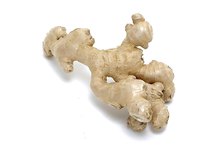Can a Turmeric Overdose Cause a Stroke?
Turmeric is a popular food ingredient that also has a long history of traditional use as a medicinal herb in Southern Asia. It contains an active ingredient called curcumin. Overuse of turmeric will not trigger the onset of a stroke; however, turmeric use can potentially interfere with the effectiveness of certain stroke medications. Consult your doctor before introducing a turmeric supplement into your diet.
Turmeric Basics
Turmeric comes from the roots and bulbs of a ginger relative called Curcuma longa. It is a main ingredient in curry, and gives curry preparations their characteristic taste and yellow color. According to the University of Maryland Medical Center, or UMMC, the curcumin in turmeric is a powerful antioxidant, and can help protect your cells from various forms of damage triggered by the presence of harmful particles or molecules called free radicals 1. Potential uses of supplemental turmeric -- with at least some scientific verification -- include maintaining absence of the symptoms of ulcerative colitis and treating the symptoms of indigestion and other digestive disorders.
- Turmeric comes from the roots and bulbs of a ginger relative called Curcuma longa.
- According to the University of Maryland Medical Center, or UMMC, the curcumin in turmeric is a powerful antioxidant, and can help protect your cells from various forms of damage triggered by the presence of harmful particles or molecules called free radicals 1.
Turmeric Safety
How Does Turmeric Damage Or Benefit the Liver?
Learn More
Turmeric use is safe for most adults, the National Center for Complementary and Alternative Medicine reports 2. If you take high doses of the herb, or take it for prolonged periods of time, however, you can develop symptoms that include diarrhea, nausea or indigestion. In severe cases, excess consumption of turmeric can lead to the development of gastrointestinal ulcers. In laboratory testing, animals given high doses of turmeric sometimes developed liver problems; however, these effects are not known to occur in human beings.
- Turmeric use is safe for most adults, the National Center for Complementary and Alternative Medicine reports 2.
- If you take high doses of the herb, or take it for prolonged periods of time, however, you can develop symptoms that include diarrhea, nausea or indigestion.
Stroke Basics
Strokes come in two basic forms: ischemic stroke and hemorrhagic stroke. In an ischemic stroke, a clot in an artery feeding blood to your brain either completely blocks off the artery, or breaks loose and blocks off another smaller artery. In a hemorrhagic stroke, a blood vessel inside your brain weakens, breaks open and spills blood into your brain. In turn, continuing blood flow from the burst vessel damages the affected brain tissue.
- Strokes come in two basic forms: ischemic stroke and hemorrhagic stroke.
- In a hemorrhagic stroke, a blood vessel inside your brain weakens, breaks open and spills blood into your brain.
Turmeric and Stroke Medications
Can Turmeric Cause Blood Sugar Levels to Drop?
Learn More
People with ischemic stroke sometimes receive drugs called anticoagulants, or blood thinners, which achieve their effects by reducing the normal tendency of platelets -- clotting components in your blood -- to clump together. Common blood-thinning medications include clopidogrel, sold commercially as Plavix; warfarin, sold commercially as Coumadin; and aspirin. If you take turmeric in combination with any of these medications, the UMMC explains, it can potentially interfere with their effectiveness by changing your blood’s clotting characteristics. If you use any anticoagulant medication, speak with your doctor and get his advice before you use any supplement labeled as turmeric or curcumin. Also ask him for information on potential adverse interactions between turmeric and other medications.
- People with ischemic stroke sometimes receive drugs called anticoagulants, or blood thinners, which achieve their effects by reducing the normal tendency of platelets -- clotting components in your blood -- to clump together.
- If you take turmeric in combination with any of these medications, the UMMC explains, it can potentially interfere with their effectiveness by changing your blood’s clotting characteristics.
Related Articles
References
- University of Maryland Medical Center: Turmeric
- National Center for Complementary and Alternative Medicine: Herbs at a Glance; Turmeric
- National Heart Blood and Lung Institute: Who Is at Risk For a Stroke??
- Hewlings SJ, Kalman DS. Curcumin: A Review of Its' Effects on Human Health. Foods. 2017;6(10)
Writer Bio
M. Gideon Hoyle is a writer living outside of Houston. Previously, he produced brochures and a wide variety of other materials for a nonprofit educational foundation. He now specializes in topics related to health, exercise and nutrition, publishing for various websites.









